外研版七年级英语下册Module 1 Lost and found Unit 2 教案
Module1LostandfoundUnit1课件七年级英语下册
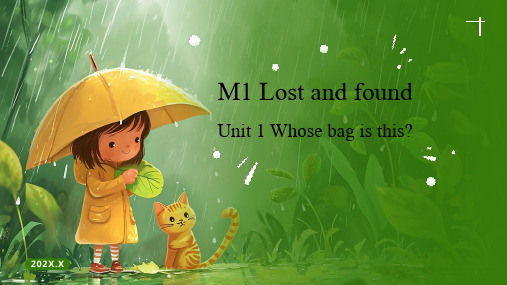
春天在哪里
形容词 9.仔细的;认真的;小心的 careful _
10.谁的 whose
代词
11.我的 mine 12.你(们)的 yours _
13.她的 hers _
兼词 14.adj.紫色的,紫红色的 n.紫色,紫红色
purpl_e
我眼中的春天
Pre-listening 听前
Have you ever lost WsomhDeeirdtehydinoidgu yifmionupdofiritnt?adnitt??
5.我想它是贝蒂的。 I think it’s Betty’s.
6.从现在开始,请每个人 Everyone,please be careful with
小心保管自己的物品。 your things from now on.
春天在哪里
While-listening 听中
1. Where are the speakers and who are they?
2. What are they talking about?
春天在哪里
① Where are the speakers and who are they?
They are at school. They are Ms Li, Tony, Daming and Lingling.
春天在哪里
一座小金库, 无砖又无木。 随身常相伴, 账单它来付。
What did Daming lose? He lost a wallet.
春天在哪里
春天在哪里
It’s __m_y__phone. = It’s _m__in_e_.
春天在哪里
It’s _L_i_F_a_n_g_’_swatch. = It’s __h_e_r_ watch.=It’s __h_e_rs__.
外研版七年级下册英语第一模块《M1.Lostandfound》重要知识点总结
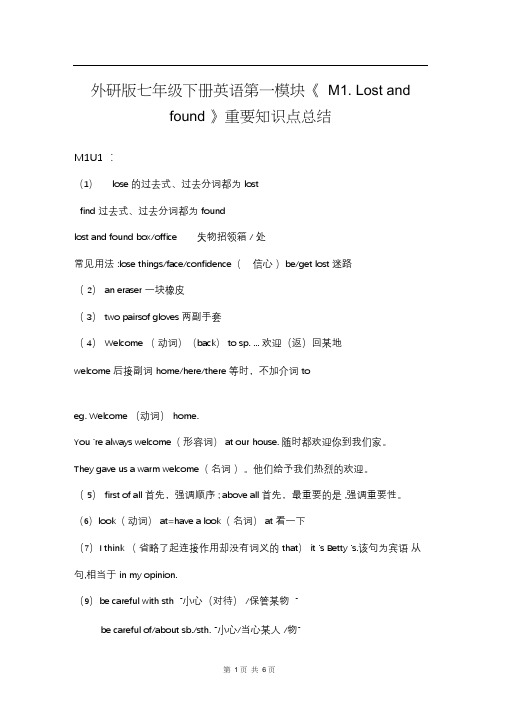
外研版七年级下册英语第一模块《M1. Lost andfound 》重要知识点总结M1U1 :(1)lose 的过去式、过去分词都为lostfind 过去式、过去分词都为foundlost and found box/office 失物招领箱/ 处常见用法:lose things/face/confidence(信心)be/get lost 迷路(2)an eraser 一块橡皮(3)two pairsof gloves 两副手套(4)Welcome (动词)(back) to sp. ... 欢迎(返)回某地welcome 后接副词home/here/there 等时,不加介词toeg. Welcome (动词)home.You 're always welcome(形容词) at our house. 随时都欢迎你到我们家。
They gave us a warm welcome(名词)。
他们给予我们热烈的欢迎。
(5)first of all 首先,强调顺序; above all 首先,最重要的是,强调重要性。
(6)look(动词) at=have a look(名词) at 看一下(7)I think (省略了起连接作用却没有词义的that) it 's Betty 's.该句为宾语从句,相当于in my opinion.(9)be careful with sth “小心(对待)/保管某物”be careful of/about sb./sth. “小心/当心某人/物”be careful (not) to do sth. “小心(不)做某事”(10)from now/then/1982 on 从现在/那时/1982 年开始(9)Here be(is/are)... “...... 在这”,be 动词遵循语法的“就近原则” ,同there be 句型。
eg.S1.Here isan eraser. S2.Here aretwo purple wallets.M1U2 :(1)at the lost and found office 在失物招领处(2)look for 有目的地寻找,强调动作&find 强调结果,意为“找到” 。
外研版英语七年级下册Module1 Lost and found知识点总结

七下(外研版)Module 1 知识点总结一、必背短语welcome back first of all lost and found box a lot of things 欢迎回到首先失物招领箱许多东西be careful with from now on here is/ are let sb do sth 小心对待从现在起这里有让某人做某事get on in a hurry leave sth somewhere that’s why上(车,船等)匆忙地把某物落在某地那是…的原因hundreds of look for at the moment play the piano 成百上千的寻找现在,此刻弹钢琴ride a bike on the board would like to do sth that’s all 骑自行车在布告上想要做某事仅此而已what about you? w hat about/how about doing sth join…club 你呢?做某事怎么样加入俱乐部worry about担心二、必背句子1.Welcome back to school. Come and look in the lost and found box.欢迎回到学校。
首先来看看这个失物招领箱。
2.There are a lot of things in it.里面有许多东西。
3.Whose bag is this?这个袋子是谁的?4.Here is a purple wallet.这里有个紫色的钱包。
5. Please be careful with your things from now on.从现在起请你们小心对待自己的东西。
6. People often lose things when they’re travelling or when they’re in a hurry. 人们在旅游或匆匆忙忙时经常丢东西。
外研版七年级下册英语课文原文与翻译
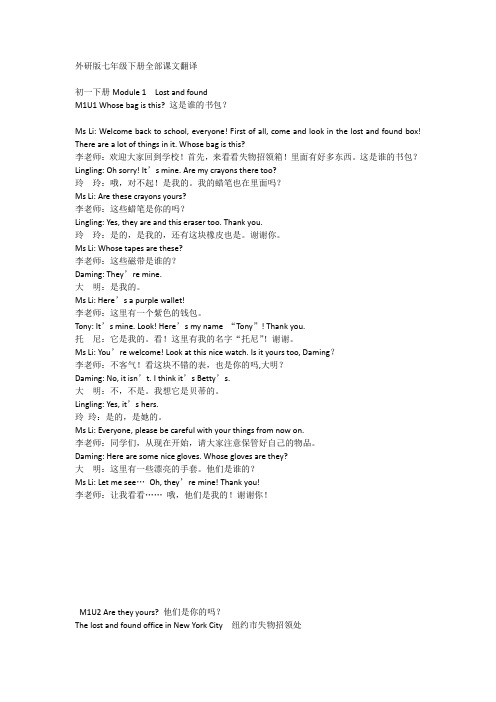
外研版七年级下册全部课文翻译初一下册Module 1 Lost and foundM1U1 Whose bag is this? 这是谁的书包?Ms Li: Welcome back to school, everyone! First of all, come and look in the lost and found box! There are a lot of things in it. Whose bag is this?李老师:欢迎大家回到学校!首先,来看看失物招领箱!里面有好多东西。
这是谁的书包?Lingling: Oh sorry! It’s mine. Are my crayons there too?玲玲:哦,对不起!是我的。
我的蜡笔也在里面吗?Ms Li: Are these crayons yours?李老师:这些蜡笔是你的吗?Lingling: Yes, they are and this eraser too. Thank you.玲玲:是的,是我的,还有这块橡皮也是。
谢谢你。
Ms Li: Whose tapes are these?李老师:这些磁带是谁的?Daming: They’re mine.大明:是我的。
Ms Li: Here’s a purple wallet!李老师:这里有一个紫色的钱包。
Tony: It’s mine. Look! Here’s my name “Tony”! Thank you.托尼:它是我的。
看!这里有我的名字“托尼”!谢谢。
Ms Li: You’re welcome! Look at this nice watch. Is it yours too, Daming?李老师:不客气!看这块不错的表,也是你的吗,大明?Daming: No, it isn’t. I think it’s Betty’s.大明:不,不是。
我想它是贝蒂的。
外研版七年级英语下册 Module 1 Lost and found Unit 1 Whose

my bag.
3. 你昨天找loo到ke李d 明for了吗?
--Did yfoinud____ Li Ming
yesterday?
whose
提问部分定语时,用“Whose +n.+ 一般疑问句?” 这是谁的衬衫? Whose shirt is it? 这是我的衬衫。 It’s my shirt. 提问部分表语时,用“Whose +一般 疑问句?” 这件衬衫是我的。
gloves are they? M: Let me see… Oh, they’re mine! Thank
Remember these
欢迎重p返hrawseelscome back 首先;第一 to 失物招领箱 first of all
许多 lost and found 小心 box 从现在开始 a lot of / lots 口语, “不客 of 气”, 用来回 be careful 答别人的感谢 with
单
第一 第二 人称 人称
数
第三 人称
第一 人称
复数
第二 第三 人称 人称
/maɪn/ mine 我的
/jɔ:z/ yours 你(们)的
/'pə:pl/ purple 紫色的; 紫红
色的
/hə:z/ hers 紫色;紫红
色
/'kεəful careful 她的
/ from now 仔细的; 认真
on
的;
Listen, read and M: Welcome balecakrnto school, everyone! First
1
Unit 1
Whose bag is this?
Xiang Yuanlan From Guqiao Middle School
(完整)外研版七年级英语下册教案:Module1LostandfoundUnit1Whosebagi
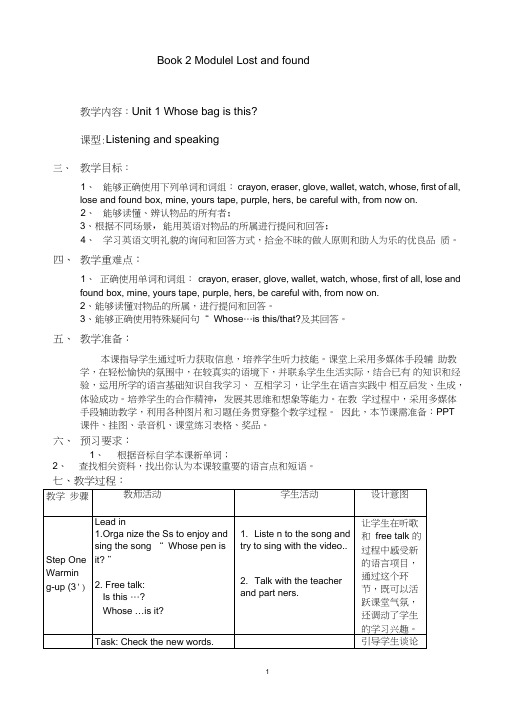
Book 2 Modulel Lost and found教学内容:Unit 1 Whose bag is this?课型:Listening and speaking三、教学目标:1、能够正确使用下列单词和词组:crayon, eraser, glove, wallet, watch, whose, first of all,lose and found box, mine, yours tape, purple, hers, be careful with, from now on.2、能够读懂、辨认物品的所有者;3、根据不同场景,能用英语对物品的所属进行提问和回答;4、学习英语文明礼貌的询问和回答方式,拾金不昧的做人原则和助人为乐的优良品质。
四、教学重难点:1、正确使用单词和词组:crayon, eraser, glove, wallet, watch, whose, first of all, lose andfound box, mine, yours tape, purple, hers, be careful with, from now on.2、能够读懂对物品的所属,进行提问和回答。
3、能够正确使用特殊疑问句“ Whose…is this/that?及其回答。
五、教学准备:本课指导学生通过听力获取信息,培养学生听力技能。
课堂上采用多媒体手段辅助教学,在轻松愉快的氛围中,在较真实的语境下,并联系学生生活实际,结合已有的知识和经验,运用所学的语言基础知识自我学习、互相学习,让学生在语言实践中相互启发、生成,体验成功。
培养学生的合作精神,发展其思维和想象等能力。
在教学过程中,采用多媒体手段辅助教学,利用各种图片和习题任务贯穿整个教学过程。
因此,本节课需准备:PPT 课件、挂图、录音机、课堂练习表格、奖品。
六、预习要求:1、根据音标自学本课新单词;2、查找相关资料,找出你认为本课较重要的语言点和短语。
2020-2021学年七年级英语外研版下册Module1Lostandfound教案

举例:学生在角色扮演活动中,能够使用这些句型进行有效沟通。
(3)语法:掌握一般现在时的用法,特别是在失物招领场景中的应用。
举例:学生在写作和口语表达中,能够正确运用一般现在时描述失物招领情况。
在小组讨论环节,学生们表现出较高的积极性,能够围绕主题展开讨论。但在引导和启发学生思考时,我发现有些问题的设置可能过于宽泛,导致学生的讨论不够深入。在今后的教学中,我将更加注意问题的设置,提高讨论的针对性。
此外,今天的课堂总结环节,学生们对所学知识的掌握程度较高,但仍有个别学生表示对某些知识点存在疑问。针对这一情况,我计划在课后进行个别辅导,确保每位学生都能跟上教学进度。
4.学习能力:培养学生自主、合作、探究的学习方式,激发他们学习英语的兴趣和积极性,形成有效的学习策略。
三、教学难点与重点
1.教学重点
(1)词汇:重点掌握与失物招领相关的词汇,如lost, found, bag, book, key, mobile phone等。
举例:学生在实际场景中能够正确使用这些词汇描述丢失和找到的物品。
在新课讲授环节,我注意到有些学生在理解词汇和句型时存在一定的困难。在今后的教学中,我需要更加关注这部,角色扮演活动受到了学生们的欢迎。他们能够在模拟的失物招领场景中,运用所学词汇和句型进行沟通。但同时,我也发现部分学生在口语表达方面仍需加强,例如语音、语调等方面的准确性。
2020-2021学年七年级英语外研版下册Module1 Lost and found教案
一、教学内容
本节课选自2020-2021学年七年级英语外研版下册Module1 Lost and found,主要涵盖以下内容:
2021年外研版英语七年级下册课件:Module 1 Lost and found(共71张PPT)
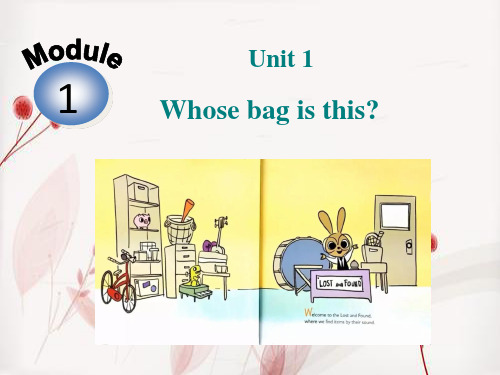
Daming: Here are some nice gloves. Whose gloves are they?
Ms Li: Let me see… Oh, they're mine! Thank you!
• Whose bag is this? • Whose tapes are these? • Here's a purple wallet. • Look at this nice watch. Is it yours too? • Here are some nice gloves. Whose gloves are they? • Everyone, please be careful with your things from now on.
There’s a lost and found box in the classroom. There are many things in it.
A: …Come and look in the lost and found box! There are a lot of things in it. Whose … is this?
Ms Li: You're welcome! Look at this nice watch. Is it yours too, Daming?
Daming: No, it isn't. I think it's Betty's.
Lingling: Yes, it's hers.
Ms Li: Everyone, please be careful with your things from now on.
Lead in
Whose bike is this?
新外研版七年级册英语下册Module1 Lost and found Unit 1课件

her Give it to _________. ( she )
3. This is a dog. _________ black. It’s its ________ colour is black. ( it )
yours Sam? 4. Is this pencil ________, _______ must look after ______ You your things well. ( you ) 5. That is not _________ English book. his _________ is at home. ( he ) His
IV. 根据汉语意思完成下列英语句子,每 空一词(含缩略形式)。 1. 首先,让我告诉你这个消息。 _____ First ___ of ____, all let me tell you the news. 2. 买一套房子要花一大笔钱。 It takes ____ a ____ lot _____ of money to buy a house. 3. 这个小男孩正面带微笑地看着我。 The little boy ____ is _______ looking ____ at me with a big smile.
What are these?
They’re Lingling’s _________. crayons
What’s this? Whose is this?
1
2
3
4
5
6
7
8
Work in pairs. Ask answer.
— Are the crayons Betty’s?
— No, they’re not hers.
七年级英语外研版下Module1LostandFound说课稿
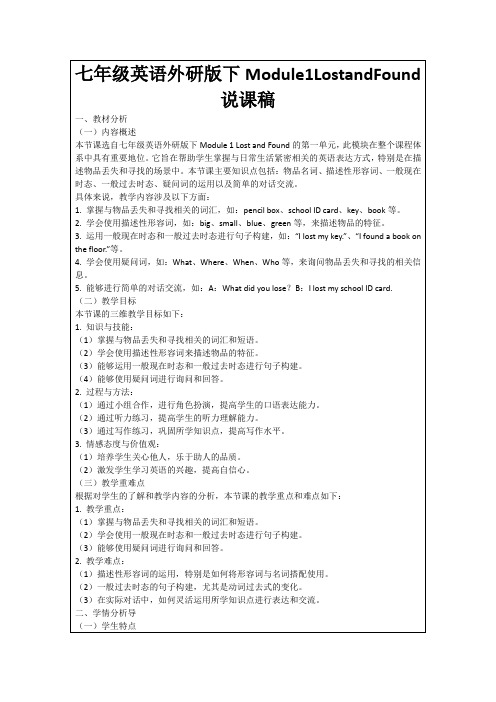
课后,我将通过以下方式评估教学效果:
1.收集学生的课堂练习和课后作业,分析错误类型和频率。
2.与学生进行交流,了解他们的学习体验和感受。
反思和改进措施包括:
-根据学生的反馈和学习情况,调整教学方法,如增加小组合作的机会,提供更多的口语练习。
-加强对难点知识点的讲解和复习,确保学生能够扎实掌握。
1.创设情境:通过设计真实、有趣的物品丢失和寻找情境,让学生在角色扮演中自然地运用所学知识,提高他们的学习兴趣。
2.小组合作:组织学生进行小组合作,互相提问、回答,提高学生的参与度和互动性。
3.游戏活动:设计相关词汇和语法点的游戏,如“猜物品”、“接龙”等,让学生在轻松愉快的氛围中学习英语。
4.成功体验:对学生的每一次进步给予及时表扬和鼓励,让他们感受到学习英语的成就感,增强学习动机。
七年级英语外研版下Module1LostandFound说课稿
一、教材分析
(一)内容概述
本节课选自七年级英语外研版下Module 1 Lost and Found的第一单元,此模块在整个课程体系中具有重要地位。它旨在帮助学生掌握与日常生活紧密相关的英语表达方式,特别是在描述物品丢失和寻找的场景中。本节课主要知识点包括:物品名词、描述性形容词、一般现在时态、一般过去时态、疑问词的运用以及简单的对话交流。
4.学会使用疑问词,如:What、Where、When、Who等,来询问物品丢失和寻找的相关信息。
5.能够进行简单的对话交流,如:A:What did you lose?B:I lost my school ID card.
(二)教学目标
本节课的三维教学目标如下:
1.知识与技能:
Module1 Lost and found Unit 1 课件外研版七年级英语下册

Leatn’gsudaugbe! point
lose v. 失去 (后面可以跟失去的事物,也可以跟输掉的比
赛等。) 过去式:__lo_s_t___ e.g. Lily lost her bike last week.
I hope (希望) we won’t lose the basketball match ( 比赛) tomorrow. (翻译) Lily上S周ophi丢a 了她的自行车。 我希望我们不会输掉明天的篮球赛。
Sophia
Pre-listening
What’s this? It’s the lost and found box.
/lɒst/ /faʊnd/
Sophia
in the lost and found box...
Here is ... a bag
Sophia
Here are ... tapes /teɪp/
【语境应So用phia】翻译句子。 1) 那些是谁的蜡笔? Whose crayons are these? 2) 它们是谁的玫瑰花? Whose roses are they?
Leatn’gsudaugbe! point
4. Here’s a purple wallet! 这有个紫色的钱包! 以here开头的倒装句,句子的真正主语是a purple wallet。 Here is / are ...: ……在这儿。用于刚找到某人或某物时; be动 词单复数形式要与后面主语的单复数形式保持一致。 e.g. 这有三块手表。 Here are three watches. 它来了。 Here it comes.
It’s hers. hers=her scarf
John
2023新外研版七年级下英语全册课文电子版

2023新外研版七年级下英语全册课文电子版Module 1 Lost and foundUnit1 Whose bag is thisMs Li: Wele back to school everyone! First of all, e and look in the lost and found box! There are a lot of things in it. Whose bag is this Lingling: Oh sorry! It’s mine. Are my crayon s there too Ms Li: Are these crayons yoursLingling: Yes, they are and this eraser too. Thank you.Ms Li: Whose tapes are these Daming: They’re mine.Ms Li: Here’s a purple wallet!Tony: It’s mine. Look! Here’s my name ―Tony‖! Thank you.Ms Li: You’re wele! Look at this nice watch. Isit yours too, Daming Daming: No, it isn’t. I think it’s Betty’s. Lingling: Yes, it’s hers.Ms Li: Everyone, please be careful with your things from now on.Daming: Here are some nice gloves. Whose gloves are they Ms Li: Let me see... Oh, they’re mine! Thank you!Unit2Are they yoursThe Lost and Found Office in New York CityWele to the New York City Lost and Found Office. People often lose things when they’re travelingor when they’re in a hurry. They leave things on pla nes, on trains, on buses and in taxis. That’s why there are lost and found offices at airports and stations.The New York City Lost and Found Office is very big. Hundreds of people e here every day. They are looking for their phones, cameras, watches, puters and many other things. We usually have about two thousand mobile phones and one thousand cameras.At the moment, there are also some strange things at the New York City Lost and Found Office. There are about a hundred bikes and a large boat. There are also a lot of animals. This week, there are three dogs, twoducks and a pig! Whose are they Are they yours We don’t know! Are you looking for fifteen kilos of sausages They’re here too!Module 1crayon n.蜡笔raser n.橡皮擦glove n.手套wallet n.钱包watch n.表;〔通常指〕手表whose pron.谁的first of all 首先;第一lose v.失去findv.发现;找到lost and found box 失物招领箱mine pron.我的yours pron.你〔们〕的tape n.录音带;录像带purple n.紫色;紫红色hers pron.她的careful adj.仔细的;小心的be careful with 小心〔对待〕……from now on 从如今起here is/are…在这儿camera n.照相机phone n. ;机mobile phone 挪动;手机lost and found office 失物招领箱in a hurry 匆匆忙忙leave v.丢下;遗忘plane n.飞机taxi n.出租车why adv.为什么airplane n.机场;航空港hundred num.百hundreds of 几百;成百上千look for 寻找thousand num.千strange adj.奇怪的boat n.船duck n.鸭pig n.猪sausage n.香肠;腊肠Module 2 What can you doUnit1 Ican play the piano.Daming: Look ! The new clubs for this term are on the board. I’d like to join the Music Club because I can play the piano. What about you, BettyBetty: I like cooking, so I can join the Food and Drink Club. Can you cook, DamingDaming: No, I can’t. Well, I can cook eggs, but that’s all. What about Lingling Which club can she joinBetty:I think she’d like to join the Dancing Club because she can dancereally well .Tony , how about youTony: I’d like to join the Chine se Club. Ican’t speak Chinese very well.Daming: Don’t worry about Chinese. We can teach you Chinese! So choose your favourite club.Tony: OK then..I play table tennis, so I choose the Table Tennis Club.That’s my favourite!Unit2 I can run really fast.It’s the start of the new term and we’rechoosing our new monitors.I’d like to be the class monitor. I get on well with everyone, classmates and teachers. I work very hard, and I do well at school .I’m kind and I’m always ready to help others. I can even help teachers too. Choose me as your class monitor and I promise to help YOU!I want to be the PE monitor .I enjoy sport, and I can run really fast. I’m really fit and healthy. Just watch me in the playground between lessons! I play most ball games well. But I’m really good at football, and I play basketball in the school team. I usuallyget the best score in every match. Choose me for the PE monitor and you can get the best score too!I’d like to be the cleaning monitor. I often help my mother do cleaning at home and I like a clean and tidy house. I’m sure everybody would like a clean classroom, just like home. Choose me and we can make our classroom beautiful.Module 3 Making plansDaming: On Saturday morning, I’m going to check my email and do my homewo rk. Then I’m going to help with the housework. What are you going to do, Betty Betty: I’m going to see a movie in the afternoon. You can e too.Daming: Sure! Who else is going to be thereBetty: Nobody. Lingling is going to have a piano lesson, so she c an’t e with us, but on Sunday afternoon, Lingling and I are going to have a picnic. Would you like to join usDaming: Yes, I’d love to. Are we going to meet hereBetty: No, we aren’t. We are going to meet inthe park at one o’clock.Tony: Hi, everyone!Tony: Nothing. I’m going to stay at home alone.Unit 2 We are going to cheer the playersWhat are you going to doA-------MartinB------Zhang SijiaC-------LucyModule4Life in the futureUnit 1Everyone will study at home.Ms Li: Will schools be different in the future, DamingDaming: Yes, there will! In twenty years time, maybe there won’t be any schools!Ms Li: How will students learn thenDaming: Everyone will study at home. Studentswill use puters and get information on the Inter. They can ask their teachers by Inter, telephone or email.Tony: Yes. Teachers won’t use on a blackboard and students won’t use pens and paper, or erasers any more!Lingling: Great! Will students have a lot of homework to doTony: No, they won’t. They’ll have a lot offree time!Daming: That’ll be great!Unit2Every family will have a small plane.What will life be like in the future How will things change Here are some ideas. Which ones will e trueA In the future, a change of weather won’t mean a change of clothes. W e’ll wear a new kind of clothes. They’ll be warm when we’re cold, and cool whenwe’re hot.B There’ll be no more light rain and cold wind in spring. The weather will be quite warm or even hot all year, with heavy rain and wind. The sea level willrise as well.CWe won’t travel by bus or bike any more. Every family will have a small plane. No more expensive cars - it’ll be cheap to travel everywhere by plane, not only over land, but also over the sea or even into space. Maybe there’ll be traffic jams in the air.D Do you like long holidays Well, you’re going to like the future becausemachines and robots will do all the heavy and difficult jobs, and we’ll only do light and easy work. Working hours will be short so people will have long holidays.Module 5 ShoppingUNIT 1What can Ido for you(In the shop)Shop Worker: What can I do for youLingling: I'd like to buy a T-shirt for my mum.Shop worker: What colour does she likeLingling; Purple.Shop worker: All right .What size does she takeLingling: Small.Shop worker: What about this oneLingling: May I try it onShop worker: Certainly.Lingling: Look at the price .It's 198 yuan .That's too much.Shop worker: But wait a minute !There's a sale on today .Everything is half price.Lingling: OK! I'll take it .(In the market)Lingling: I've got some food to buy too.Market worker : Can I help youLingling: Yes.I'd like some sausages.How much are theyMarket worker : Thirty-eight yuan a kilo.How much would you likeLingling: Half a kilo.Market worker: OK. What else would you likeLingling: A kilo of beans and two lemons.Market worker : That'll be 30 yuan.Betty: Oh ,the strawberries look fresh .How much are theyMarket worker : Ten yuan a kilo.Betty: One kilo please .Here's fifty-nine yuan.Unit 2 You can buy everything on the Inter.Online shoppingThere are many new ways of shopping, and online shopping is one of them .You can buy almost everything on the Inter .and it's very easy .First ,you choose something-clothes, tickets, a mobile phone, even a new puter -and pay for it. Then you receive it a few days later by post .Online shopping is changing our way of life .One day no one will go to the shops any more ,becauseyou'll be able to buy anything on the Inter ,and you will be able to receive it anywhere in the world at any time!Module 6 Around townUnit1Could you tell me how to get to the National Stadium(Betty and Lingling are standing in front ofTian'a____en Square.)Tourist: Excuse me! Can you tell me the way to Wangfujing DajieBetty: Certainly. Go acro ss Dong Chang’an Jie, go along the street and turn left at the third street on the left. It’s near here, so you can walk there.Tourist: Great. And I’d like to buy a guidebook about Beijing. Is there a bookshop near here Lingling: Yes, there is a big bookshop over there, just along Xi Chang’an Jie, on the right, opposite the bank.Tourist: Right, OK! I also want to visit the National Stadium. How can I get thereLingling: Sorry, I’m not sure. Why not ask the policeman over thereTourist: Thank you.Bett y and Lingling: You’re wele.Tourist: Could you tell me how to get to the National StadiumPoliceman: Sure! Go along the street and you’ll see an underground station. Take the Underground to the Olympic Sports Centre, or you can take a bus or a taxi.Tourist: Thanks a lot.Policeman: You’re wele. Have a nice day!Unit2 The London Eye is on your rightTour of LondonWele to this short tour of London. This square is Trafalgar Square and it is the middle of London.We’re standing opposite the National Gal lery, a famous museum with lots of famous paintings. From here, we’ll walk along the red street to Buckingham Palace. The Queen lives there.Turn left and go to the Houses of Parliament and Big Ben. Opposite you can see the London Eye. It takes you 135 metres above the River Thames. You can see most of London on a clear day.When you are tired, the best way to see London is by boat. You can get the boat near Big Ben. As you go along the river, the London Eye is on your right.Get off the boat at Tower Bridge. Next to the bridge is the Tower of London. It’s over 900 years old.After visiting the Tower of London, take the boat back along the river to the railway station. When you get off the boat, go past the station and walk alongthe street. Turn left into K ing’s Street and go past a church. You’re now back at the square. And this is where we’ll finish our tour.Module 7 My past lifeUnit1 I was born in a small villageTony: Hey, Lingling. Where were you bornLingling: I was born in a small village in Shanxi Province.Tony: What was the name of the villageLingling: Xucun. Where were you born, TonyTony: I was born in Cambridge. It’s a small city in England.Lingling: What was the name of your first school Tony: It was Darwin Primary School.Lingling: Who was your first teacherTony: My first teacher was Mrs Lane. She wasstrict but very nice. Who was your first teacher Tony: Their names were Becky and Adam. Becky was very good in class but Adam wasn’t. He was quite difficult.Lingling: And what were you like Were youdifficult in class tooTony: No, I wasn’t. I was very good!Unit 2 I was born in QuincyMy life in QuincyBy Betty KingI was born in Quincy, a town on the east coast of America, twelve years ago. There were lots of things to do in Quincy, with many stores, two movie theaters, football clubs and basketball teams too. I wasn’t bored in Quincy. I was very happy there.Two presidents of the US, John Adams and his son John Quincy Adams, were born in Quincy. You can visit their old family houses. Our house was big and fortable. There was a big living room with a TV, a kitchen, a bathroom and three bedrooms. On my bedroom walls there were pictures of my favourite movie stars.Behind the house, there was a big garden with lots of trees and there was a small lake with fish in it.It was great to play there.Module 8 Story timeUnit 1 Once upon a time…Tony: All alone in the dark dark forest, Goldilocks picked some flowers.Daming: Oh, did she often go for a walk in the forest aloneTony: No, she didn’t. And soon she was lost. Goldilocks looked around her. “Where am I she asked. Then she noticed a little house, so she hurried towards it, and knocked on the door., Nobody answered, so she knocked again, and again, Finally, she pushed the door. It was open. There was nobody there.Daming: Oh! Didn’t anyone live in the houseTony: Just wait a moment, Daming! Goldilocks entered the house and look into a small room. On a table there were three bowls with some nice food in them. One bowl was small, one was big and one was very big. Goldilocks was very hungry. She picked up the very big bowl but she didn’t like it—it was very hot,. Then she picked up the big bowl, but she didn’t like it –it was cold. The little bowl was just right. She finished all the food in it.Unit2 Goldilocks hurried out of the houseGoldilocks and the Three BearsGoldilocks wanted to sit down because she was tired. First she tried the big chair, but wasn’t fortable. Then she tried the middle chair. It was not fortable either. Finally, she tried the small chair.It was nice and fortable, but Goldilocks was very heavy and soon the chair was in pieces.She walked into the bedroom. There were three beds. She didn’t like the middle bed or the big bed. The small bed was very fortable. Very soon she was asleep in it.The Three Bears returned. They looked at the bowls and the chairs. Baby Bear cried,” There’s nothing in my bowl and my chair is in pieces!” He wasn’t very happy!Next, the Bears looked in their bedroom. They didn’t notice Goldiloc ks at first. Then Baby Bear pointed at the little girl in his bed and shouted, “Look! There’s the bad girl!”Goldilocks opened her eyes. The Three Bears wereall around her, so Goldilocks jumped out of bed and hurried out of the house without her basket. Shedidn’t go for a walk in the forest again.Module 9 Life historyUnit1 He left school and began work at the age of 12.Betty: What are you readingTony: Tom Sawyer, by the famous American writer, Mark Twain. I’m writing about him for my English class.Betty: I read Tom Sawyer. Very good! Hey, we can find out about him on the Inter.Tony: Yes! ... OK. Look at this! His real namewas Samuel Clemens and he was born in 1835 in Missouri. He left school and began work at the age of 12.Betty: What did he doTony: He wrote for a newspaper Later he got work on a boat..Betty: Did he stay in MissouriTony: No, he went to New York, and other cities.Betty: When did he begin his storiesTony: I don’t know the exact date. But he took the name Mark Twain and became very famous in the1860s. He went to Europe as well. But he didn’t e to China.Betty: Yes, I knew that. Enjoy the book.Tony: Yes, it’s good.Unit 2 He decided to be an actorWilliam Shakespeare was a famous English writer of plays and poems. He wrote 38 plays, 154 short poemsand a few long poems in his life. Two of his famous plays are Hamlet and Romeo and Juliet.Shakespeare was born in 1564 in Stratford, England. Like many people four hundred years ago, Shakespeare’s parents didn’t learn to rea d or write. At school he liked plays, so he decided to be an actor when he finished school at 14. He married in 1582 and had three children.Shakespeare went to London and joined a theatre pany in about 1592. He became a successful actor andbegan to write plays. Queen Elizabeth I enjoyed his works very much.In 1599 the pany built the Globe Theatre on the River Thames in London. You can visit the theatre today, but it isn’t the same building. There was a fire in the old theatre. They built it again in 1614 and in the 1990s.William Shakespeare died at the age of 52. He was rich and successful. You can still see his plays in English and in many the languages. He’s famous around the world..Module10 A holiday journeyUnit1 what did you doLingling: Where are you going on holiday, TonyTony: To Los Angeles.Betty: Oh, really You’ll love it! I went there two years ago and enjoyed it a lot.Tony: How long did it take to get there Did you flyLingling: Who was with youBetty: My parents.Lingling: So what did you doBetty: Well, first, we went to Disneyland, and guess what I met SnowWhite and Mickey Mouse! I was so excited!Tony: Wow! How long did you stay thereBetty: We stayed there for two days. And then we went to Hollywood.Lingling: Did you see any movie startsBetty: No, but we swam in the Pacific Ocean at Santa Monica. It wasgreat!Lingling: Where are you going on holiday this year, BettyBetty: Paris.Unit2 This morning we took a walk .Hi, Grandma! Here I m in Paris. Jenny and Iarrived by plane the day before yesterday. Aunt Joan and Uncle Peter met us at the airport. We were tired so we relaxed at home and began our tour of the city yesterday.Yesterday we went to the Louvre Museum. It has many world-famous works of art, such as the Mona Lisa.In the evening we had dinner in a French restaurant. The food was delicious!This morning we took a walk. There are shops, and restaurants everywhere, and I love the street and markets. They sell such good fruit and vegetables. We also did some shopping. I bought a present for you. I hope you’ll like it!At about three o’clock, we took the Paris Underground to the Eiffel Tower. It is really high. There were lots of tourists, so first of all, we had to wait in line for an hour, and then we went to the top. We waited till all the lights were on. It was wonderful!Tomorrow we’re going to visit a famous palace and take a boat tour on the River Seine. I’ll write again.Love,BerryModule 11 Body languageUnit 1 They touch noses!Lingling: We’re going to have s ome Russian teachers at school tomorrow, and I’m weling the visitors. How do I do thatBetty: Lingling, you know, in Russia, people usually kiss three times, left, right, left.Lingling: What! No, I didn’t know that. We Chinese often shake hands and smile when we meet visitors, and sometimes we nod our heads . But we never kiss. Only parents and children do that.Betty: That’s because people do different things in different countries.Lingling: So what do people in the US usually do when they meetBetty: In the US some people shake hands, and some kiss or hug each other. In India people put their hands together and nod their heads. And do your know what Maori people in New Zealand do when they meet Lingling: No, What do they doBetty: They touch noses!Unit2 Here are some ways to wele them.Body language around the worldby Wang LinglingOur new foreign students are going to arrive very soon, and here are some ways to wele them.Do you look at people when you talk In some places, it isn’t polite to loo k at people when they talk, but in other countries it isn’t polite to look somewhere else. In Britain and the US, people usually look at each other when they talk.And how do you say goodbye That’s easy, wave to say goodbye. But be careful! In Greece, it’s not atall polite! In fact, it’s very rude!Module 12 Western musicUnit 1 It’s so beautiful!(The Blue Danube)Daming: Hmm, this is Western music, isn’t it Can you hear the violin and the piano It’s so beautiful! Is this by Strauss or MozartLingling: I’m not sure…Betty: It’s by Strauss. I love his music! Do you know anything about him, TonyTony: Was he GermanBetty: No, he was born in Vienna, the capital of Austria. What a beautiful city! This is called TheBlue Danube. The Danube is a river in Europe. It goes through Vienna.Lingling: Do you like both. You listen to pop music, BettyBetty: Well, I like both. You listen to pop music, Lingling ,don’t youLingling: Yes, I do. I also like Beijing opera. Listen to this fantastic voice.Tony: Hmm, th e sound is very … different, isn’t it I’m a fan of rock music. Listen to this!Daming: Hey! Give us a break!Lingling: Rock music Listen to those drums.Daming: It’s so noisy! And much too fast!Tony: You don’t like rock music I don’t believe it!Unit 2 Vienna is the centre of European classical music.The city of musicVienna is a beautiful old city on the River Danube in the centre of Europe. It’s the capital city of Austria and the centre of European classical music. In the eighteenth century a lot of musicians came tostudy and work in Vienna.In the Strauss family, there were two poserscalled Johann Strauss: the father and the son. The father, Johann Strauss the elder, wrote and played music for traditional dances, called the waltz. His dance music made him famous all over Europe. The son, Johann Strauss the younger, was also very successful and popular. He wrote over 150 waltzes. In 1867 he wrote The Blue Danube waltz.Mozart was another very important poser. He was born in Austria in 1756. Before he was six, he played not only the piano but also the violin. His familytook him around Europe and he gave concerts in many cities. He wrote hundreds of wonderful pieces of music. But he became very poor and died in 1791 when he was only 35. Like Johann Strauss, father and son, he was agreat European musician, and many people still think his music is perfect.。
Module1LostandfoundUnit1教学设计2023-2024学年外研版七年级英语下册

(1)导入:教师通过向学生展示一些丢失和找到物品的真实情境图片,引导学生谈论相关话题,激发学生的学习兴趣。
(2)新课内容学习:教师运用讲授法,向学生介绍本节课的基本词汇和句型,如“lose”,“find”,“excited”,“thank you”等,并通过举例和情景模拟的方式,让学生理解和掌握这些词汇和句型的用法。
四、教学方法与策略
1. 选择适合教学目标和学习者特点的教学方法:本节课将采用讲授法、互动讨论法和任务型教学法相结合的方式进行教学。讲授法用于向学生传授丢失和找到物品的基本词汇和句型;互动讨论法用于激发学生的思维,培养他们的合作和交流意识;任务型教学法则通过实际操作让学生在实践中运用所学知识,提高他们的语言能力。
阅读材料:
a. "Lost and Found: Real-Life Stories",这本书收录了多个真实的丢失和找到物品的故事,让学生在阅读中了解如何在现实生活中运用所学知识解决问题。
b. "The Power of Gratitude: How to Express Thanks in Different Situations",这篇文章介绍了在不同情境下表达感激之情的方式,帮助学生学会如何向他人表示感谢。
4.教学时数:1课时(45分钟)
二、核心素养目标
1. 语言能力:通过本节课的学习,学生能够听懂、会说、会读、会写与丢失和找到物品相关的基本词汇和句型,如“lose”,“find”,“excited”,“thank you”等,并能够在实际情境中运用。
2. 文化意识:通过学习本节课,学生能够了解和感知到在丢失物品时,向他人寻求帮助和表示感谢的重要性,培养他们的合作和交流意识。
外研社英语新版七年下册(M1,M2,M3全解)

外研社英语七年级下册MODULE 1 lost and found Unit 1: 1. welcome back to …欢迎返回…;You are welcome.别客气。
别客气。
You are welcomed. 你是被欢迎的。
你是被欢迎的。
2. everyone 不定代词,“每个人”,指、只指人,不指物,不与of 连用。
谓语动词用单三形式。
连用。
谓语动词用单三形式。
every one 即可指人,也可指物,可与介词of 连用。
Every one of us has a chance to speak at the meeting. 3. first of all = firstly = above all 首先; at first 起初起初起初 4. lost and found box “失物招领箱”“失物招领箱”5. there be 句型的时态:句型的时态:一般现在时There is/are There is (some) milk in the fridge. 一般过去时There was/ were There was nothing special about the meal 一般将来时There will be/ is going to be There will be rain next week. 过去将来时There would be/ was going to be There would be/ was going to be Our teacher told us that there would be a test on Monday. Our teacher told us that there would be a test on Monday. 现在完成时There have/has been There has been an increase in the number of road incidents recently. 过去完成时There had been There had been a lot of earthquakes in this area. 6. a lot of/lots of 许多;a lot 相当于very much ,意为“非常”。
外研版七年级英语下册M1-6重点总结
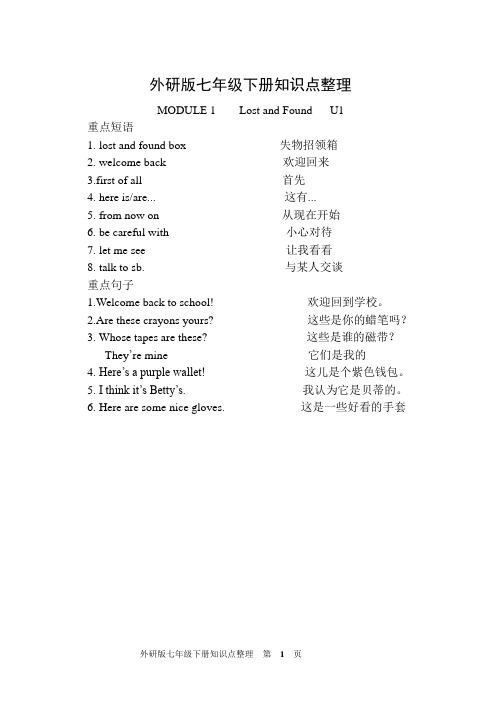
外研版七年级下册知识点整理MODULE 1 Lost and Found U1重点短语1. lost and found box 失物招领箱2. welcome back 欢迎回来3.first of all 首先4. here is/are... 这有...5. from now on 从现在开始6. be careful with 小心对待7. let me see 让我看看8. talk to sb. 与某人交谈重点句子1.Welcome back to school! 欢迎回到学校。
2.Are these crayons yours? 这些是你的蜡笔吗?3. Whose tapes are these? 这些是谁的磁带?They’re mine 它们是我的4. Here’s a purple wallet!这儿是个紫色钱包。
5. I think it’s Betty’s.我认为它是贝蒂的。
6. Here are some nice gloves. 这是一些好看的手套MODULE 1 Lost and Found U2重点短语9. mobile phone 移动电话,手机10. get on the bus 上车11. two thousand 两千12. look for 寻找13. at the moment 现在14. in a hurry 匆忙地15.many other things 许多其他的东西16. hundreds of 数以百计的17. strange things 奇怪的东西18. fifteen kilos of sausages 15公斤的香肠19. such as 例如重点句子7. They leave things on planes, on trains, on buses and in taxis.8. That's why there are lots and found office is at airports and stations9. Hundreds of people come here every day.10.They are looking for their phones cameras, watches, computers and many other things11.There are about a hundred bikes and a large boat12. Are you looking for fifteen kilos of sausages?7.他们把东西落在飞机上,火车上,公交车上或者出租车上。
- 1、下载文档前请自行甄别文档内容的完整性,平台不提供额外的编辑、内容补充、找答案等附加服务。
- 2、"仅部分预览"的文档,不可在线预览部分如存在完整性等问题,可反馈申请退款(可完整预览的文档不适用该条件!)。
- 3、如文档侵犯您的权益,请联系客服反馈,我们会尽快为您处理(人工客服工作时间:9:00-18:30)。
Module One Lost and found
Unit Two Are they yours?
I.Teaching analysis
It is an introduction about Lost and Found office in London. Losing is a general problem in many places. Many people may face such problems. What should we do if we lose something? And what does the Lost and Found office look like in London ?This text can help students enrich knowledge and broaden their horizons. Most students may be interested in this topic but the Grammar is a little difficult for them.
II. Teaching goals
1. Language goals
a. words and expressions:Lost and Found office, leave, thousand, strange, hundreds of, look for, in a hurry,sausages
b. Sentences: Is this …?/ Are these …?
It is mine/theirs/ours…
They are his/hers…
2.Skill goals
Student should know the use of nominal possessive pronoun. They should know the differences between “my,his,her…”and “mine,his,hers…”
3Emotional goals
Student should learn how to solve problems when they lose something .Firstly,we should be careful with our things.Then we should learn how to describe our lost things and ask for help.
4.Teaching difficulties
Student may be confused about the use of possessive case of nouns because there are some differences between Chinese and English expressions.
III.Teaching steps
quickly and answer my questions;”Where is the lost and found office?”, ”what’s in the lost and found office this week?”
2. Read paragraph1,2 &
3. Finish the mind map(when where why what).
Step 3. Express 表达
[操作方式]分段朗读并根据思维导图复述课文。
Imitate the passage, pay attention to the intonation and pronunciation. Then let us retell according to the mind map.
Step 4.Exercies 练习
[操作方式]根据课文,完成练习3。
Do activity 3 according to the passage.
Step 5. Use 运用Post-reading
[操作方式]小组活动。
老师先在黑板上带领学生做一个海报。
通过头脑风暴的方式让学生了解并学会怎样制作海报。
然后学生自己动手制作一个失物招领的海报。
Look at the blackboard. Now let discuss. When we lost something, or pick up something ,what should we do ?(brain- storm).
V:Introspection:
It was students’ first time to meet nominal possessive pronoun so some students made mistakes. I think next lesson we should do some relative exercises to help them.
For the discussion and presentation,some students was a
little shy to show themselves. So I should try to encourage them to be confident. I should give students more chances to present them.。
